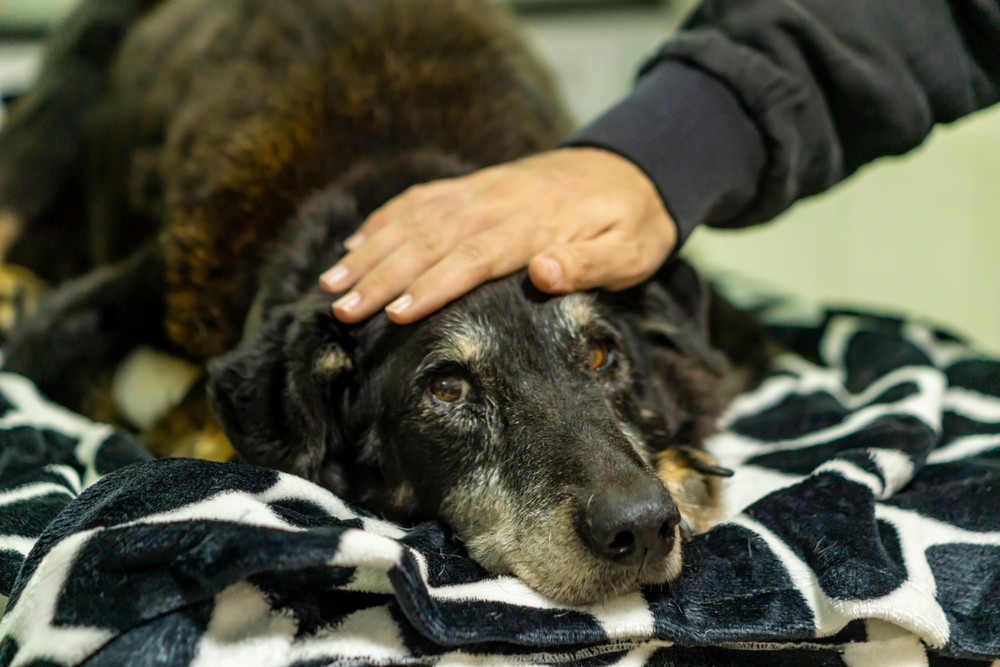Helping Pets Age with Comfort, Dignity, and Love
Saying goodbye to a pet is one of the hardest decisions a family can face. Subtle signs like struggling to stand, losing interest in meals, or seeming uncomfortable every day can signal that extra support is needed. End-of-life care is about making pets comfortable, honoring their dignity, and helping families through an emotional time.
At Bayview Animal Hospital in St. Petersburg, FL, we offer guidance, pain relief, and compassionate care for pets in their final chapter.
Understanding End-of-Life Care for Pets
Recognizing the Signs of Aging and Illness
As pets age, their bodies and minds undergo changes that can significantly impact their quality of life. Understanding these changes helps owners provide appropriate care and make informed decisions about their pet’s well-being.
Physical Aging Signs in Pets
Physical changes often appear gradually. Dogs and cats may show decreased mobility, favoring certain limbs or moving more slowly than usual. Loss of appetite becomes common, whether from dental pain, nausea, or general discomfort. Many pets also experience changes in their sleep patterns, bathroom habits, or social interactions. Some common pet pain signs include reluctance to move, excessive panting, hiding, or changes in posture that indicate discomfort.
Cognitive Aging Signs in Pets
Cognitive changes present another layer of complexity in aging pets. Dogs particularly may develop cognitive dysfunction syndrome, which shares similarities with human dementia. Pets with cognitive dysfunction may show signs of disorientation, altered sleep-wake cycles, decreased interaction with family members, or changes in house training habits. These behavioral shifts often distress families who wonder if their pet is suffering or simply adjusting to age-related changes.
To help navigate these concerns, veterinarians recommend using assessment tools like the Quality of Life Scale. This evaluation system considers factors such as pain levels, appetite, mobility, and emotional well-being to provide a more objective measure of a pet’s comfort and happiness.
The Role of Veterinary Care in End-of-Life Support
Professional veterinary support becomes crucial during a pet’s senior years. Pain management and palliative care focus on maintaining comfort rather than pursuing aggressive treatments that may cause additional stress. Modern veterinary medicine offers numerous options for managing chronic conditions, including targeted medications, laser therapy for joint pain, and specialized treatments for arthritis management.
Regular veterinary visits take on increased importance as pets age. These appointments allow veterinarians to monitor changes in health status, adjust pain management protocols, and discuss quality of life concerns with families. At Bayview Animal Hospital, we work closely with families to develop individualized care plans that prioritize comfort and dignity while addressing specific medical needs.
Creating a Comfortable Environment for Your Aging Pet
Home Modifications for Aging Pets
Simple environmental changes can dramatically improve an aging pet’s daily comfort and independence. Mobility challenges often respond well to practical solutions that require minimal investment but provide significant benefits.
Assistive devices for dogs with arthritis include ramps for accessing furniture or vehicles, orthopedic bedding that supports joints, and harnesses that provide stability during walks. These tools help maintain independence while reducing strain on painful joints.
Creating an arthritis-friendly home involves strategic placement of resources and removal of obstacles. Non-slip rugs on smooth surfaces prevent falls, while elevated food and water bowls reduce neck strain during meals. Consider relocating litter boxes to ground level for cats or providing multiple boxes throughout the house to minimize travel distances.
Nutritional and Emotional Support for Aging Pets
Proper nutrition supports overall health and can help manage specific conditions common in senior pets. While individual dietary needs vary, senior pets often benefit from easily digestible foods that support joint health and maintain appropriate body weight. Obesity places additional stress on aging joints, while underweight pets may lack the energy needed for daily activities.
Emotional well-being deserves equal attention alongside physical comfort. Maintaining routine provides security for pets experiencing cognitive changes, while gentle mental stimulation can help preserve cognitive function. For cats, the feline grimace scale offers a valuable tool for monitoring pain levels, as cats often hide discomfort more effectively than dogs.
Making Difficult Decisions for Your Pet with Compassion
When is it Time to Say Goodbye?
Determining when a pet’s quality of life has declined beyond acceptable levels requires careful consideration of multiple factors. This decision cannot be made based on a single bad day or temporary setback, but rather on overall trends in comfort and happiness.
Try to evaluate key pet health considerations, such as your pet’s:
- Ability to enjoy favorite activities
- Response to pain management
- Appetite and hydration status
- Mobility levels
- Overall demeanor
When more bad days than good become the norm, and when pain cannot be adequately controlled, families may need to consider end-of-life options.
Consulting with veterinarians provides essential guidance during this difficult process. Open discussions about prognosis, treatment options, and quality of life expectations help families make informed decisions aligned with their values and their pet’s best interests. These conversations should occur before crisis situations arise, allowing time for thoughtful consideration and planning.
Supporting Your Family Through Pet Loss
The emotional impact of losing a pet affects every family member differently. Adults may struggle with guilt over timing decisions, while children may experience their first encounter with death and grief. There are comprehensive grief resources available for navigating this challenging time.
Professional support can provide valuable assistance during the grieving process. Some pet loss support resources connect families with counselors who understand the unique bond between humans and animals. These resources acknowledge that pet loss represents a genuine form of grief deserving of support and understanding.
Children require special consideration during pet loss. Some resources provide age-appropriate strategies for explaining death, involving children in farewell rituals, and supporting their emotional processing. Honesty, combined with reassurance about the pet’s lack of pain, helps children understand and accept the situation.
Resources and Support for Grieving Pet Owners
Community and Online Support Networks for Pet Grief
Pet loss support extends beyond immediate family and the veterinary team to include broader community resources. Support groups connect grieving pet owners with others who understand their experience, reducing feelings of isolation and providing practical coping strategies.
Organizations like APLB offer specialized bereavement resources designed specifically for pet loss. These services recognize that the human-animal bond creates genuine grief that deserves acknowledgment and support. Local veterinary practices often maintain connections with these resources and can provide referrals when appropriate.
For personalized guidance throughout your pet’s end-of-life journey, reach out to experienced professionals who understand both the medical and emotional aspects of this process. Bayview Animal Hospital provides compassionate support tailored to each family’s unique situation and needs.

Continuing Care and Memorializing Your Pet
Creating lasting memories helps families process grief while celebrating the joy their pet brought to their lives. Memorial options range from simple photo albums to more elaborate tributes, depending on family preferences and traditions. Some families plant gardens, create artwork, or donate to animal welfare organizations in their pet’s memory.
Planning for future pets requires careful timing and consideration. While some families find comfort in welcoming a new animal companion relatively quickly, others need extended time to grieve before considering another pet. Neither approach is right or wrong; families should follow their own emotional timeline and readiness.
Moving Forward After Pet Loss with Love and Support
End-of-life care for pets represents one of the most profound expressions of love owners can provide. When your pet shows persistent signs of discomfort, stops enjoying daily activities, experiences difficulty with basic functions like eating or walking, or seems withdrawn from family interactions, professional guidance becomes essential.
At Bayview Animal Hospital, our comprehensive approach to senior pet care includes laser therapy for pain management, quality of life assessments, and compassionate end-of-life support when needed. We understand that these decisions require time, information, and emotional support to navigate successfully. To discuss your pet’s needs or schedule an appointment, contact our team online or by calling (727) 477-1442. We’re ready to guide you through this challenging time with expertise and understanding.







Leave A Comment